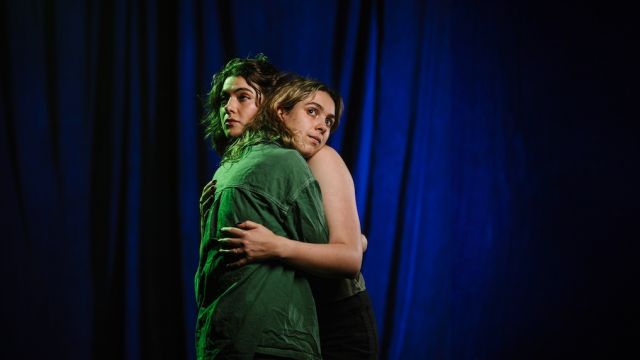You’re Being Dramatic
The title, You’re Being Dramatic, sounds like a put-down, as in ‘now you’re being dramatic…’ As in, ‘Now you’re getting emotional, calm down, don’t make a scene.’ That inhibition, that fear of conflict, is the crux of Zadie Kennedy McCracken’s play. Sometimes it might be best to be ‘dramatic’ - or not and live to regret it.
I was reminded of one of Brecht’s poems, ‘Song About My Mother’, where he says, ‘Oh why do we not say the important things, it would be so easy, and we are damned because we do not. Easy words, they were, pressing against our teeth; they fell out as we laughed, and now they choke us.’
Arvy (Jess Sofarnos) and Thea (Megan Mitchell) are besties – the best of besties – but not lovers. McCracken says she wrote the play for her fifteen-year-old self – so that’s what these girls are. Each week Arvy and Thea have a sleepover where they talk, exchange experiences, grumble, drink vodka, cuddle and eventually, maybe, fall asleep all on a big, rumbled bed of twisted bedclothes, pillows and cushions – and Thea’s soft cuddly rabbit toy. Arvy seems the more grown-up, harder, but also the more anxious and guarded – an inward, almost closed performance from Sofarnos that, of course, makes the character even more intimidating for Thea (an absolutely credible performance from Mitchell). Thea is softer, seems somehow younger, tentative, emotional, and more all over the place. It is always Thea who initiates physical contact…
We spend just one of these nights with them, a night when it rains and rains and thunder rumbles in the distance, but a night where things are about to change, where things could get ‘dramatic’. While Arvy can be abstracted by melancholy memories of a previous relationship with a woman called Hannah, Thea has – or is on the brink of having – a boyfriend. Nothing’s happened – yet. But Thea hangs on Arvy’s reaction. Thea asks sexual questions. Arvy is evasive.
But the events of that night happen in retrospect. There is a framing device: Arvy and Thea, much older, meet at a bar and talk about the past. Ella Campbell’s design for this separate location is a sort of canopy and a sweep of tulle that add a sort of fairy tale tone to the meeting. The tone is tender, wistful, one of wry regret. In a fine directorial touch, they are seated separately – and here we find some of the best of McCracken’s writing.
You’re Being Dramatic is a well-observed play about the intense emotions of these uncertain, emotional, self-protective teenage girls. It’s a play about evasion, of characters talking past each other, almost deliberately misunderstanding each other – and not saying what needs to be said.
Unfortunately, despite the ring of truth to the characters and their dialogue, McCracken chooses to tell us her story in very short scenes of the crucial night, interspersed with short scenes in the present at the bar. The intention is, I guess, a sort of montage of moments effect, but what we get is a dramaturgy of snippets. We are constantly jerked out of engagement and thus emotion, as, in partial blackouts with portentous music, Sofarnos and Mitchell must move between teenage bed and the grown-up bar meeting. Dramaturg Ruby Rees might have been tougher on this mode of storytelling. In any case, as this is a play about things not being said, the subject matter is delicate – or to be harsh, rather thin. It just doesn’t hold up for nearly ninety minutes because we get it – we’re too far ahead of Thea for too long.
McCracken also adds jeopardy – or what I take to be her intention – by having some rowdy male or group of males – unseen – pound on the door and yell things like, ‘I know you’re in there!’ This is repeated. Initially, it’s frightening, but as it goes on and Thea and Arvy don’t do anything about it – until warrior Arvy marches off stage with a cricket bat – it feels phony. A huge set-up with no pay-off. Clearly nothing happened because when Arvy and Thea meet in the bar, both are unscathed. So, all up, this device isn’t just puzzling, it’s annoying.
But You’re Being Dramatic is, as remarked, well observed and truthful, and about the sad consequences of not speaking out. A shorter, more unified text would be an excellent play for discussion in high schools – and beyond. McCracken is described as an ‘emerging writer’ – and, I guess, director. We look forward to what she does next.
Michael Brindley
Photographer: Morgan Roberts
Subscribe to our E-Newsletter, buy our latest print edition or find a Performing Arts book at Book Nook.

